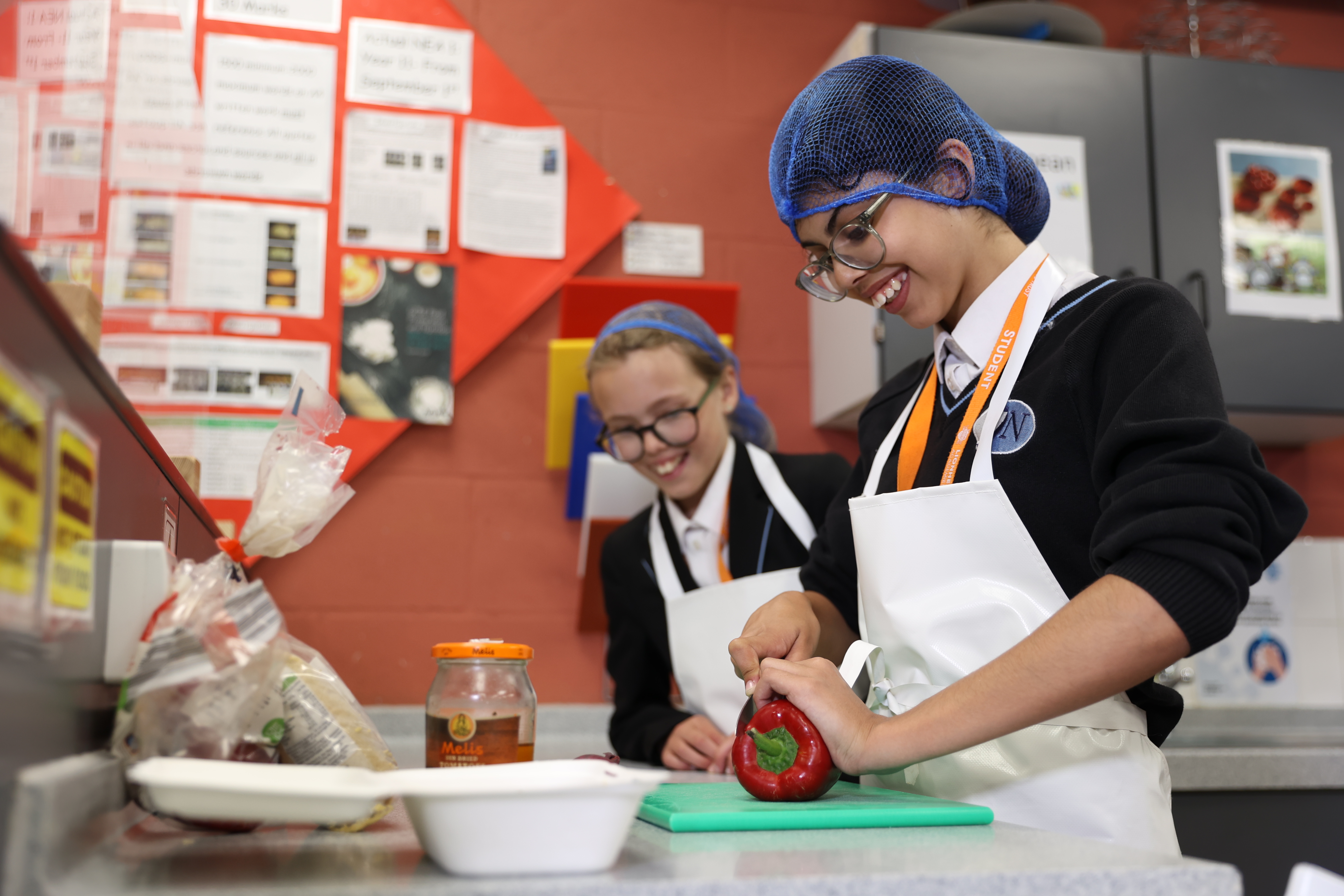
D & T - Food and Nutrition
Food and Nutrition lessons at SJN are designed to inspire, engage and instil a passion for cooking in everyone.Curriculum rationale
Food and Nutrition lessons at SJN are designed to inspire, engage and instil a passion for cooking in everyone. Students will plan, prepare and cook a range of dishes suitable for a healthy lifestyle. Students will study the nutritional value of ingredients and learn how and why they work. Students will learn to work in a safe and hygienic kitchen and, through practical lessons, students will gain technical knowledge and skills. Students will be able to consider career opportunities available within the Food Industry. Two pathways are offered in year 9/10 - Level1/2 Hospitality and Catering and GCSE Food Preparation and Nutrition.
Food is a vital area within your child’s education. When selecting options during the latter part of KS3 study, students will have gained a repertoire of skills through Years 7 & 8. Students will be given the confidence to be able to select ingredients and cook nutritional healthy dishes for the rest of their lives. If students decide to progress to Year 9/10 studying Food, they will be able to recall and retrieve information learnt previously at KS3 and build on their knowledge learned in Years 7 and 8.
In Years 7 and 8 students will begin with a health and safety lesson. Classroom practices reflect the food industry and how professionals undertake training and keep up to date to changes. Across KS3, students will work both in groups and independently to build skills with being resourceful, resilient and capable citizens.
Curriculum Design
Essential skills are taught throughout the curriculum.
These include:
- Practical skills developed using a range of materials and equipment within each subject area
- Communication and presentation techniques, including presentation communication techniques, presentation of data and written communication styles for design.
- Knowledge and understanding of working properties of ingredients and materials and how these are used in existing products and can be used in their own work to meet a range of user needs.
- Critical analysis and evaluation skills. Students develop skills to analyse the work of others to learn about past and present design to inform future design approaches. They will look closely at their own work and the work of others, including professionals.
The curriculum allows a range of opportunities for students to develop effective knowledge retention which is necessary for exam preparation. This includes regular retrieval practice and tests.
Curriculum Plan
Key Stage 3
In Years 7-9 Food and Nutrition is taught on a 13 week rotation system.
|
|
Year 7 |
Year 8 |
Year 9 |
|
Topic |
Food Science, Safety, Nutrition and Provenance
|
Food Science, Safety, Nutrition and Provenance
|
Topics: Food Science Safety, Nutrition, Choice, Provenance
|
|
Key Retainable Knowledge
|
|
|
|
|
Assessment:
|
|
|
|
Curriculum Assessment
Students will be given theory tests in lessons to assess their knowledge and understanding with all theory topics. Students will sit one Hospitality and Catering practice written exam paper in the Autumn term of their first year of study.
Practical skills and coursework will be assessed regularly over the course of study in their second year of study. One to one tutorials will be regularly given to students to discuss progress and development.
Level 1/2 – Hospitality and Catering
Students will develop a coursework project using preparation and planning skills. This is worth 60% of their overall grade. Students will also learn about a wider range of ingredients, knowledge of different life stages, cultural traditions and dietary needs. Students will sit a written exam in their first year of their course about the Hospitality and Catering Industry.
In the first year of the course, students will develop their knowledge and understanding in many areas such practical skills eg bread and pastry making, job roles and food safety in the Hospitality and Catering industry.
Students will sit a practical mock exam in June of their first year of study to practice their practical making skills. Students will undertake a practical trial for their project work. Students will begin to research, plan, design and develop work for their trial coursework project.
In the second year of study, students receive the brief for their project work. Students begin to research, plan, design and develop work for their actual coursework project.
Students will be set written tests throughout their first year of study to allow them to develop confidence and check their theoretical learning in preparation for the written exam in their first GCSE year.

